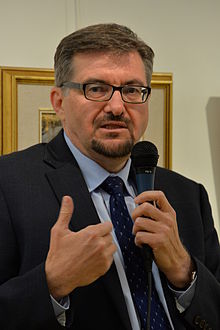
Bohdan Zynoviy Mykhailovych Khmelnytsky was a Ruthenian nobleman and military commander of Zaporozhian Cossacks as Hetman of the Zaporozhian Host, which was then under the suzerainty of the Polish–Lithuanian Commonwealth. He led an uprising against the Commonwealth and its magnates (1648–1654) that resulted in the creation of an independent Cossack state in Ukraine. In 1654, he concluded the Treaty of Pereiaslav with the Russian Tsar and allied the Cossack Hetmanate with Tsardom of Russia, thus placing central Ukraine under Russian protection. During the uprising the Cossacks he led a massacre of thousands of Poles and Jews during 1648 and 1649, making it one of the most traumatic events in the history of the Jews and antisemitism in Ukraine.

Chernobyl or Chornobyl is a partially abandoned city in the Chernobyl Exclusion Zone, situated in the Vyshhorod Raion of northern Kyiv Oblast, Ukraine. Chernobyl is about 90 kilometres (60 mi) north of Kyiv, and 160 kilometres (100 mi) southwest of the Belarusian city of Gomel. Before its evacuation, the city had about 14,000 residents. While living anywhere within the Chernobyl Exclusion Zone is technically illegal today, authorities tolerate those who choose to live within some of the less irradiated areas, and an estimated 150 people live in Chernobyl in 2020.
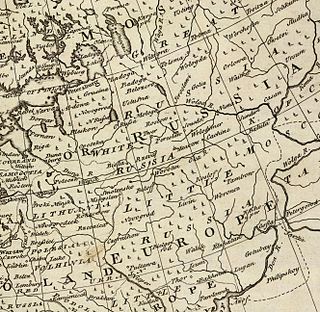
Little Russia, also known as Lesser Russia, Malorussia, Little Rus', and the French equivalent Petite Russie, is a geographical and historical term used to describe Ukraine.
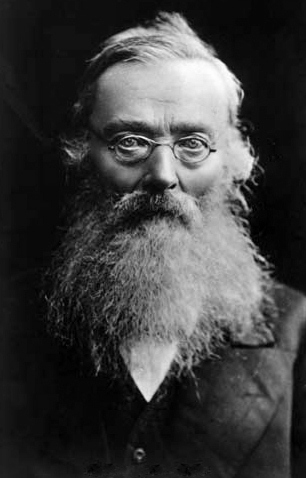
Mykola Ivanovych Kostomarov or Nikolai Ivanovich Kostomarov was one of the most distinguished Russian–Ukrainian historians, one of the first anti-Normanists, and the father of modern Ukrainian historiography. He was a professor of Russian history at the St. Vladimir University of Kiev and later at the St. Petersburg University, an Active State Councillor of Russia, an author of many books, including his biography of Bohdan Khmelnytsky, research on Stepan Razin, and his fundamental three-volume Russian history in the biographies of its most important figures.

Mykhailo Serhiiovych Hrushevsky was a Ukrainian academician, politician, historian and statesman who was one of the most important figures of the Ukrainian national revival of the early 20th century. Hrushevsky is often considered the country's greatest modern historian, the foremost organiser of scholarship, the leader of the pre-revolution Ukrainian national movement, the head of the Central Rada, and a leading cultural figure in the Ukrainian SSR during the 1920s.
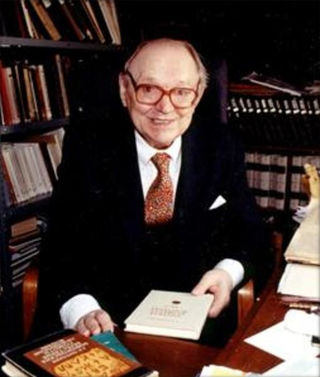
Omeljan Yosypovych Pritsak was the first Mykhailo Hrushevsky Professor of Ukrainian History at Harvard University and the founder and first director (1973–1989) of the Harvard Ukrainian Research Institute.

Mikhail Petrovich Pogodin was a Russian historian and journalist who, jointly with Nikolay Ustryalov, dominated the national historiography between the death of Nikolay Karamzin in 1826 and the rise of Sergey Solovyov in the 1850s. He is best remembered as a staunch proponent of the Normanist theory of Russian statehood.
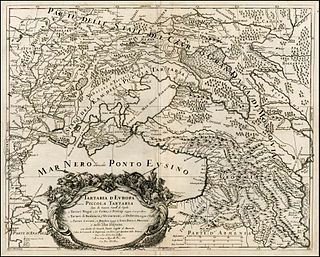
The earliest known usage of the name Ukraine appears in the Hypatian Codex of c. 1425 under the year 1187 in reference to a part of the territory of Kievan Rus'. The use of "the Ukraine" has been officially deprecated by the Ukrainian government and many English-language media publications.
Oleksander Petrovych Ohloblyn was a Ukrainian politician and historian who served as mayor of Kyiv while it was under the occupation of Nazi Germany in 1941. He was one of the most important Ukrainian émigré historians of the Cold War era.

The Shevchenko Scientific Society, founded in 1873, is a Ukrainian scientific society devoted to the promotion of scholarly research and publication.

Amvrosy Metlinsky was a Ukrainian poet, ethnographer, folklorist and panslavist. Professor at the Imperial University of Kharkov.
Kate Brown is a Professor of Science, Technology and Society at Massachusetts Institute of Technology. She is the author of Manual for Survival: A Chernobyl Guide to the Future (2019), Dispatches from Dystopia (2015), Plutopia (2013), and A Biography of No Place (2004). She was a member of the faculty at the University of Maryland, Baltimore County (UMBC) from 2000 to 2018. She is the founding consulting editor of History Unclassified in the American Historical Review.
The Little Russian identity was a cultural, political, and ethnic self-identification of a population of Ukraine who aligned themselves as one of the constituent parts of the triune Russian nationality. The Little Russian identity combined the cultures of Imperial Russia and Cossack Hetmanate.
Krytyka is a Ukrainian intellectual monthly/bi-monthly magazine and publishing house dedicated to in-depth analysis of current affairs, culture and book reviews in Ukraine and the region. Krytyka was founded by the Harvard professor of Ukrainian literature, George Grabowicz, in 1997. The magazine is a partner of the Harvard Ukrainian Research Institute, University of St. Gallen, and an exclusive partner of The New York Review of Books in Ukraine. Krytyka receives support from Western and Ukrainian foundations for its various projects, such as Robert Bosch Stiftung. Krytyka is a member of Eurozine, a network of European cultural magazines, and sees its role in mediating between Ukrainian and global intellectual elites. Since 2014, it is also available in English.

Frank Edvard Sysyn is an American historian of Ukrainian origin. His grandmother was from Ukraine.
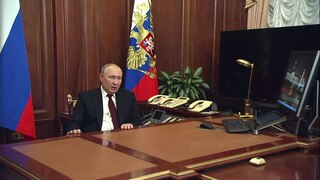
"Address concerning the events in Ukraine" was a televised address by Russian President Vladimir Putin on 21 February 2022, announcing that the Russian government would recognise the Ukrainian separatist regions of the Donetsk People's Republic and the Luhansk People's Republic as independent. During the speech, Putin also made a number of claims regarding Ukrainian history and Ukrainian domestic politics. Genocide experts, historians and other experts have shown these claims to be false and possibly justifying a genocide. The speech, which marked a significant escalation in the culminating Russo-Ukrainian crisis, was followed three days later by another speech declaring "a special military operation" in Ukraine—announcing the Russian invasion of Ukraine.

This is a select bibliography of English-language books and journal articles about the history of Ukraine. Book entries have references to journal reviews about them when helpful and available. Additional bibliographies can be found in many of the book-length works listed below. See the bibliography section for several additional book and chapter-length bibliographies from academic publishers and online bibliographies from historical associations and academic institutions.

Ivan Pavlovych Lysiak Rudnytsky was a historian of Ukrainian socio-political thought, political scientist and scholar publicist. He significantly influenced Ukrainian historical and political thought by writing over 200 historical essays, commentaries, and reviews, and also serving as editor of several book publications. He has been praised as one of the most influential Ukrainian historians of the twentieth century. He is sometimes referred to as Ivan Łysiak-Rudnytsky, but the surname he used was his mother’s name Rudnytsky.

The Origins of the Slavic Nations: Premodern Identities in Russia, Ukraine, and Belarus is a work by Serhii Plokhy and was published by Cambridge University Press in 2006. The book examines the origins of the east Slavic family of nations, Russia, Ukraine, and Belarus, and explores how their early development and complex relationship impacted their history and identities.
Donald "Don" Gary Ostrowski is an American historian, and a lecturer in history at Harvard Extension School. He specialises in the political and social history Kievan Rus' and Muscovy.
